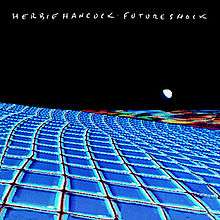Future Shock (Herbie Hancock album)
| Future Shock | ||||
|---|---|---|---|---|
 | ||||
| Studio album by Herbie Hancock | ||||
| Released | August, 1983 [1] | |||
| Recorded |
1983 OAO Studios, Brooklyn, New York RPM Studios, New York City Garage Sale Recording, Los Angeles | |||
| Genre | Electro-funk, instrumental hip hop | |||
| Length |
37:58 (original LP) 44:16 (remastered edition with bonus track) | |||
| Label |
Columbia CK 38814 | |||
| Producer |
Material Herbie Hancock | |||
| Herbie Hancock chronology | ||||
| ||||
| Professional ratings | |
|---|---|
| Review scores | |
| Source | Rating |
| Allmusic | |
| PopMatters | |
| Rolling Stone | |
| Warr.org | |
| The Rolling Stone Jazz Record Guide | |
Future Shock is pianist Herbie Hancock's thirty-fifth album and a million-selling Platinum-certified disc. It was Hancock's first release from his electro-funk era and an early example of instrumental hip hop.
About the album
Much of the album was initially composed by the team of avant-garde bassist/record producer Bill Laswell and keyboardist/producer Michael Beinhorn, and played on tour by their group Material in 1982, as a precursor to recording the follow-up album to Material's One Down album (which was famous for debuting Whitney Houston as a lead singer on a cover of the Soft Machine song "Memories"). Hancock was approached to collaborate on this recording that would go towards a postmodern direction, instead of his usual jazz-fusion. The result was a hip-hop influenced album, released under Hancock's name, which combined Hancock's keyboard mastery with Laswell's innovative arrangements and Grand Mixer DXT's turntablism.
According to 1999 re-issue's liner notes, when Laswell went to buy speakers at a music equipment store he would insist on testing them by playing the demos of "Rockit" and "Earth Beat". While those songs were played through the speakers, passing by customers apparently liked what they heard and danced to the music. Soon after Laswell let Hancock know about the incident, eventually telling him: "We got something good here."
Future Shock is the title name from Hancock's remake of the Curtis Mayfield song from ten years earlier, also featured here.
"Rockit", the album's big hit, was accompanied by one of the most successful music videos ever. The video, directed by Godley and Creme of 10cc fame, featured dancing robots made by Jim Whiting, moving around to the beat of the music and the turntable scratching. Hancock won several MTV Music Video awards in 1984, as well as the Grammy award for best R&B performance.
The album's cover art was derived from a work created by David Em.[7][8]
Track listing
All songs written by Herbie Hancock, Michael James Beinhorn and Bill O. Laswell (except where noted).
- "Rockit" - 5:28
- "Future Shock" (featuring Dwight Jackson, Jr.) (Curtis Mayfield) - 8:05
- "TFS" - 5:47
- "Earth Beat" - 5:13
- "Autodrive" - 6:27
- "Rough" (featuring Lamar Wright) - 6:58
- Remastered CD Bonus Tracks
- 7. "Rockit (Mega Mix)" - 6:18
Production credits
Producers
- Material
- Herbie Hancock
Engineers
- Dominick Maita (engineer at RPM)
- Martin Bisi (engineer at OAO)
- Dave Jerden (mix)
- Howie Weinberg (mastering)
Musicians
- Herbie Hancock: piano, synthesizer, Fairlight CMI, keyboards
- Bill Laswell: electric bass
- D.S.T.: turntables, "FX"
- Pete Cosey: electric guitar
- Michael Beinhorn: keyboards
- Daniel Poncé: percussion
- Sly Dunbar: drums, percussion
- Dwight Jackson Jr.: lead vocals on "Future Shock"
- Lamar Wright: lead vocals on "Rough"
- Bernard Fowler, D.S.T., Roger Trilling, Nicky Skopelitis: backing vocals
References
- ↑ "Future Shock by Herbie Hancock". Rate Your Music. Retrieved August 21, 2011.
- ↑ Ginell, Richard S. (2011). "Future Shock - Herbie Hancock | AllMusic". allmusic.com. Retrieved 18 July 2011.
- ↑ Zeltner, Mark (2011). "Herbie Hancock: Best of Herbie Hancock, Future Shock, Sound System, Perfect Machine < PopMatters". popmatters.com. Retrieved 18 July 2011.
- ↑ Futterman, Steve (2011). "Herbie Hancock: Future Shock : Music Reviews : Rolling Stone". web.archive.org. Archived from the original on March 3, 2009. Retrieved 18 July 2011.
- ↑ "Herbie Hancock". warr.org. 2010. Retrieved 18 July 2011.
- ↑ Swenson, J. (Editor) (1985). The Rolling Stone Jazz Record Guide. USA: Random House/Rolling Stone. p. 94. ISBN 0-394-72643-X.
- ↑ "Approach [1975] - Em, David - V&A Search the Collections". Retrieved March 27, 2016.
- ↑ Joël Vacheron (February 12, 2016). 1983: a blackened window on the world (Speech). Lift Conference 2016. Geneva, Switzerland. Retrieved March 27, 2016.